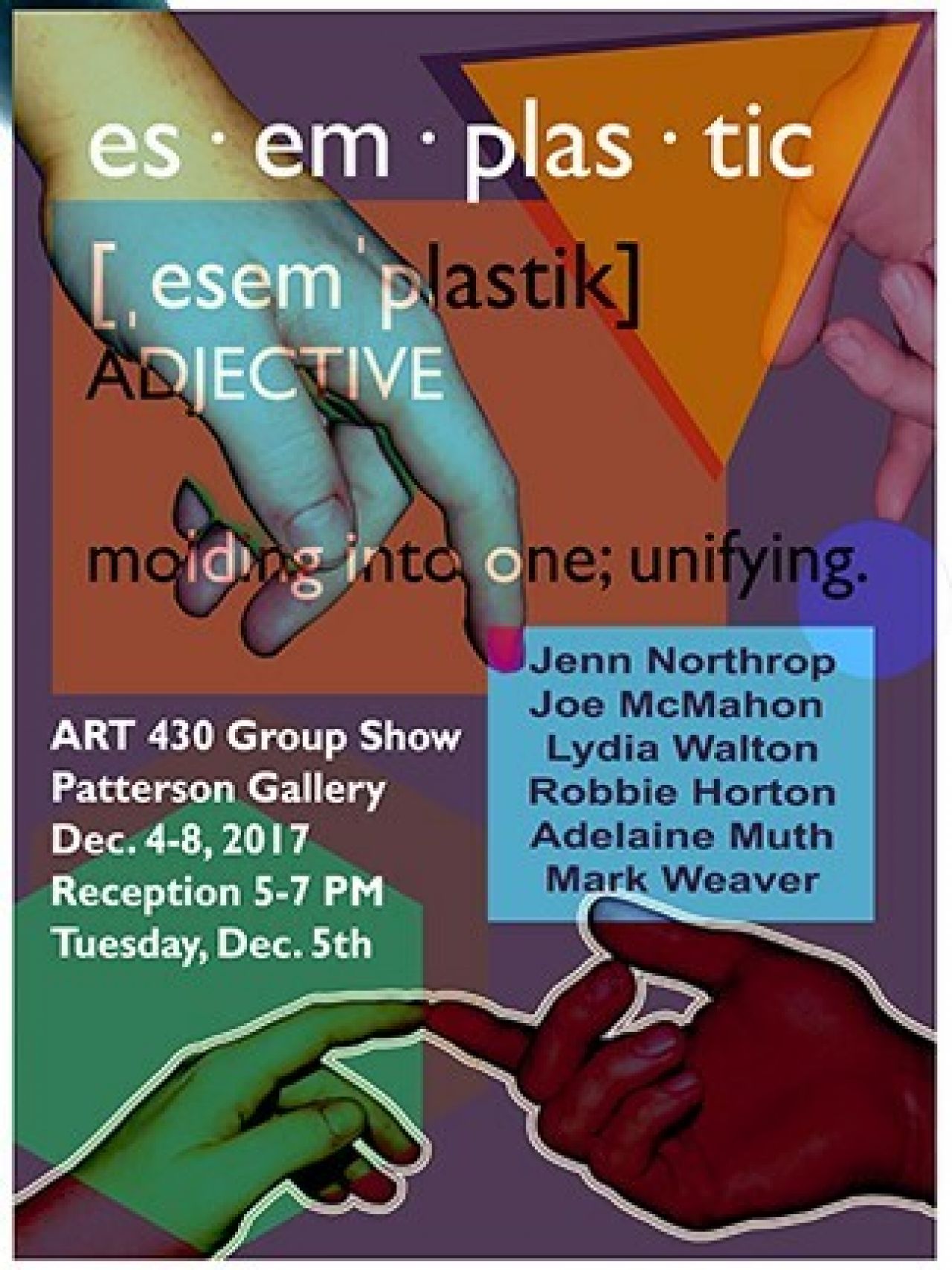October 01, 2019
Advanced Sculpture Students Present Group Exhibition

Esemplastic, a group exhibition presented by the students of Professor Cristin Millett?s Advanced Sculpture class (ART 430), will be on display in Patterson Gallery through December 8, 2017.†
The word ?Esemplastic? is defined as ?shaping or having the power to shape disparate things into a unified whole? by Merriam-Webster?s dictionary. This exhibition reflects its title by showing the common threads present in these works despite the wide range of media and approach utilized by the artists.†
Featured Artists: Joe McMahon, Adelaine Muth, Robbie Horton, Jenn Northrop, Lydia Walton, and Mark Weaver. A brief statement from each of the artists about their work is included below:
Joe McMahon:
MEAT SWEATS: The National Superfund Tour is an artpunk project focused on sustainability and the future. Queerness is experienced uniquely, distinctly, and constantly. My work tells an alternative narrative about our shared environment?one that personalizes the anthropocene and aims to intrigue the viewer rather than blame them. Raising questions about false sustainability narratives, I relate these issues to my body and my experience.
Adelaine Muth:
My work investigates the methods and components of systems?specifically, the function of the individual in relation to the whole. Through repetitive actions, parts accumulate and minimize their individual notions to create a cohesive entirety. Through large installations I investigate a bodily relation to space with ideas of growth, adaptation, and infestation.
In this piece I am more specifically looking at invasive species of plants and viruses. There is a power in mobility for these things: Invasive plant species need large, aggressive movements of seeds in order to thrive. With this piece I am thinking about mass production into a space, considering destruction and creation as simultaneous forces.
Jenn Northrop:
The Google definition of texture is "A structure of interwoven fibers or elements." This makes me think of layering a material on top of itself or another material to make up an interesting series of ridges, bumps, or other appealing feelings. The feeling of these textures can influence the way art might be perceived. Having a "please touch" aspect in certain exhibitions always comes as a pleasant surprise to me as most art, especially older pieces, tends to be too delicate to touch. Along with the physical feeling of a piece, I believe that my style uses a lot of negative space to enunciate the focal point and therefore the meaning of the art. These aspects combined lead my motives for my work.
Robbie Horton:
I firmly believe that one of the most important roles artists play in society is that of the challenger. My job is to push people, to make them question their assumptions, to encourage emotional societal growth.† To that end, I focus on challenging people with my artwork.† By using an eclectic mix of repurposed objects, I create machines, shrines, objects, and installations that threaten and defy both their original purpose and the culture that deemed them discardable. Through using found objects in my work, I confront both the assumed disposable nature of my ingredients and my own creative limits.† Each one of my pieces is designed to force the viewer to pay attention to what is taken for granted and reconsider the worldviews that allowed them to do so.
The practice of ?Rolling Coal? involves modifying the engine of a diesel pickup truck to produce large clouds of black smoke on command, usually for the purpose of harassing pedestrians, cyclists, or drivers of vehicles whom the practitioner deems ?too environmentally friendly."† Although technically illegal, rolling coal is still done frequently in America.†
Lydia Walton:
These days, stories are never more than a cell phone away. Maybe this will sound like sour grapes coming from someone who listens to many podcasts and audio books, but I miss the days of holding paper and playing pretend. So, I took a journey into my studio and my imagination. Nothing was stopping the younger me from writing and drawing comics, so why not keep on doing that as a slightly older version of myself? The pieces "Off-Day Goddess" and "Which Witch" are based on characters and stories that I devised this fall. They encourage the viewer to look for little details and to create a story of their own based on the art that they view. In my mind there is nothing wrong with a little sojourn into another world, and I'm happy to encourage others to have a bit of fun.
Mark Weaver:
As an artist, the majority of my work addresses a conflict I have between my own personal identity/beliefs and the social prescriptions that exist in the world?defining what is right, what is wrong, what is normal, and where people fit inside a false, unyielding binary. Tackling controversial subject matter, my artwork forces a reaction from viewers, and serves as a method for me to come to terms with a discrepancy of what/how one "should" and "shouldn't" be. These statements of sexuality and rebellion that I engage with are then materialized, presenting an issue that can no longer be avoided, but rather must be addressed. My current work has the internal conflict existing outside of the binary and how that might manifest outwardly or remain unnoticed by others.
